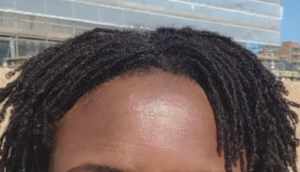I’m going to start by sharing a few things I have found out about grey hair.
For most people, our hair will turn grey due to age. Although there are many other reasons why the hair can turn grey, for example: severe protein malnutrition, autoimmune conditions, genetics and in some instances, medication.
But now I’m going to correct myself, because our hair doesn’t actually turn grey. If a strand of hair is black or brown when it grows out naturally, that particular strand will not become grey.
Hair growth cycles
Each strand of hair goes through a natural life cycle as follows: the growth phase, the transition phase and the rest phase.
When a strand of hair reaches the last phase, the rest phase, it dies and then is regenerated and it is more likely, once we’re of a certain age, that it will grow in as grey hair.
Each strand of hair is at different stage of the growth cycle. We shed around 100 strands of hair per day.
Hair follicles
Taking a step back, to explain, our hair grows out of tiny holes or pores in the outer layer of the skin known as follicles.
The hair follicle is responsible for producing the hair and is also responsible for how the hair looks. The shape of the follicle determines how curly or straight the hair is, for example an oval follicle shape is associated with curlier hair.
The follicle also dictates the colour of our hair and this is decided by the type and quantity of pigment in the follicle.
Melanin
Melanin is the overall term used to describe the natural pigment in our hair (and skin) but there are two types of melanin and it is the type and quantity that determine the actual colour.
Eumelanin is a black or brown pigment and pheomelanin produces red or yellow pigment – and all of these pigments are controlled by our genes.
As we age, our hair follicles’ ability to produce melanin decreases, and this is what leads to grey or white hair, also known as depigmented hair.
And now for some 5 interesting things to know about grey hair:
- Grey hair grows significantly faster than black (or pigmented) hair – but no-one knows why this is.
- Grey hair is thicker than black or pigmented hair.
- Stress is linked to grey hair but not in the way that we might think. Stress causes telogen effluvium, where the hair grows out three times faster than usual and sheds. If you’re middle aged when this happens, it’s possible that the hair that grows in will be grey.
- In vitro research on grey hair has shown that it may be possible, in the future, to reverse greys and potentially re-pigment hair due to the presence of melanin-producing cells in grey hair.
- Ultraviolet radiation changes your hair colour and leads to protein damage, particularly in lighter-coloured hair
In answer to the question: ‘are there reasons to love grey hair?’, I’m in two minds.
I see and understand some of the benefits of grey hair – as highlighted in this blog post, but I’m not sure whether the look is quite for me just yet.
That said, there are many in the Sisterlocks community who have amazing grey locs. And everyone’s greys are unique to them – whether they are around the temples, in the middle, interspersed throughout the hair or a full head of grey.
Watch the full video on YouTube.
Sources
Medical research articles used:
Active hair growth & thickness of grey hair
Prospect of reversal of canities in vitro
Mechanisms of hair greying
Hair damage and UV radiation
Hair melanin and photodamage


